Calliope
Everywhere, it seemed, the ordinary had been washed away, or toppled, or pierced. I was numb then though I didn’t realize it, stomping about the ruined city in my white hard hat and flimsy neon vest, lifting a heavy steel-toe over lax wires and felled branches. Numb as I noted the broken water mains and the tree-spiked roof tops, dazed as I recorded the height of every mud-flecked water line I encountered.
Occasionally I paused to read the message on a discarded refrigerator.
More often still I stopped to gaze at life’s paraphernalia as it (splotched photos, withered shoes, rusty pots, drowned dolls) lay scattered through the streets, as it (soggy dresses, bloated books, cracked glass panes, warped cabinets) was gathered and piled into mountains on the curb, on the neutral ground, anywhere we looked, and everywhere we didn’t.
I was numb every night in the shower, feeling guilty that I had a home to return to, and worse yet that I had hot water to rinse away my sweat and the stench of death and mildew. I’d gulp down food, talk to my kids, fall asleep on the couch, and rise in the dark to start again. Six to seven days a week, ten to twelve hours a day, with my assessing partner behind the wheel of his red truck, with a folded city map tossed in the space between us, and a computer on my lap, ready. Gone were the days of teaching the basics of writing to anxious freshmen, of cursing through traffic as I rushed my kids to school, of a leisurely morning bagel and newspaper in a coffee shop. Nothing was as it should be, and no one was where he should be. This included everyone I knew, friends and acquaintances who were scattered across the country, and everyone I was working with, strangers who had all lost jobs to the storm; this even included my hard-hatted, steel-toed, neon-vested self.
Over the first few weeks, I had worked every section of town except one, and after a while the Ninth Ward was finally opened to assessors and insurance adjusters. I wanted to go. Yes, I felt guilty for wanting to see an area where people had suffered and died, where the dead were still waiting to be found and exhumed. Still, I wanted to go. Job aside, I had been spared, and I had to walk every inch of the bruised city as a sort of penance that even I did not understand.
“Don’t go volunteering us,” Nick said to me, and since he had been such a good partner, I said nothing of my willingness to work the area. After many weeks together, we had an understanding, Nick and I, and that spelled the difference between a long day and an unbearably endless one. We could drive through the shocked city as silently as an old married couple, not feeling the need to fill the space around us with words. Other times, we drove, stopped, looked, and typed, all the while telling stories from our pasts and presents. If I found myself laughing hysterically over nothing and everything, I felt no need to apologize. If I found myself crying, there was no need to explain.
Days passed. Other teams were chosen to go to Ward Nine, and I envied them. But one morning, Nick was handed a new map. “Somehow, there’s an entire section of the Ninth Ward that wasn’t covered,” we were told. “Go finish the job.”
Nick eyed me suspiciously. “Don’t you look at me,” I said. But I was pleased to be chosen. Though I knew it was a terrible place to see, I wanted to go to the Ninth Ward.
* * *
Crossing the bridge that spanned the Industrial Canal was like crossing into a war zone, and we had to provide our IDs at the guarded checkpoint to prove that we belonged there. Though Prince Charles and his wife Camilla had been given a royal tour of the devastation weeks before, the residents themselves had not been allowed back. Still, the place was crawling with people—insurance adjustors, National Guard, Red Cross, and recovery workers like us.
We drove down Caffin Avenue until we got to Florida Avenue, and turned left. We drove several blocks then pulled over. Grabbing our sunglasses to guard against the glare, we got out of the car, locked it. The ground beneath our feet was several inches thick with cracked, dried mud as we walked, slowed by our disbelief, down Deslonde.
In Lakeview and parts of Gentilly where the damage was great, the street signs were often missing, but with a map a person could count the streets and know where she was. But here, the streets themselves were obscured because the houses had been shoved and scattered by the force of water—the only way we could find the “streets” was to look for the utility poles.
Front porch steps sprung out of the ground. Homes had been pulled away from their foundations; walls had been sucked away from houses that had been pushed one way or another. Power lines drooped, slack as waiting jump ropes. Stop signs leaned groundward. It was as though an angry giant, tired of the little toy village he had put together, had kicked it all away.
We walked down Deslonde till our path was blocked by a silt-covered home. Turning back, we understood: it was not that the other team had not visited the area. It was just that, with a house from one street nestled next to a house from another street that was cozying up to a house whose entire face had been obliterated, it was difficult to report on each house individually. If a house happened to be in a spot plotted on the maps we had been provided, there was no way to tell if it was the house that was supposed to be there.
The houses in this area have been pushed off their foundations, destroyed, or made otherwise unrecognizable, I typed, and then entered this in report after report. There were no references as to whether a home was one unit or two, one story or two, brick or wood, raised or on slab. There was no actual description of any home we saw—Home is located perpendicular to slab, home is perched atop a rusted, buckled car, home is split in two, home is missing—because the scene was too overwhelming to know what was true beyond the fact that no one could live here now.
The houses in this area have been pushed off their foundations, destroyed, or made otherwise unrecognizable. There was simply no way of knowing what should be where, or knowing if what we were looking at was what we thought it to be.
* * *
By the time we had finished our Red Cross lunch, the sun had vanished. We drove to another block that needed to be accounted for and passed a trio of National Guardsmen having their picture taken in front of an overturned car. We were no better—I had taken a picture of Nick crouching on a stoop that was lost in the middle of a field. He had snapped me sitting on a porch divorced from its home. Years from now, we knew, we would want proof that we had not been dreaming.
Nick turned down a street and stopped. A house blocked the rest of the road. We parked under a bedroom window.
Even though we knew we could simply enter the information blindly (The houses in this area . . . ), we tried to walk the block. “See this house right here?” Nick pointed with a wave of the map. “OK, 1203. I think this one is in the right place. But see this one next to it? See the number, 944? OK . . . I think that house comes from that street over there,” he said, pointing. “Damn. This is messed up.”
We walked. We took pictures. We skirted around houses that blocked our path. And, in time, Nick announced that we were lost. We had only walked around the block, we thought, but in reality there was no block to walk. A block calls for clear streets, a clear grid to follow. With houses blocking these streets, we had had to snake around more times than I could count.
I looked at the gray sky. It was getting late in the afternoon. We did not know how long it would be until we lost light.
“Well, we can split up and call each other . . . ,” I started.
He stopped me. “I left my phone in the car.”
I looked at him. I looked around. I couldn’t think.
“Look, stay here,” Nick said. “I’ll walk this way and see if I recognize anything.” He walked off. “And don’t go nowhere!” he yelled over his shoulder.
Please, where would I go? Hugging myself against the chill, I looked around. I felt useless and out-of-place. Occasionally, a car passed and a driver waved. I waved back, trying to look purposeful, not conspicuous, abandoned, lost. And just when I thought I could not feel any more ridiculous, a familiar, persistent sound emerged.
I paused. I listened. I realized I was hearing a tune drifting to me over wind. I held my breath and tried to focus, tried to piece the notes together as they traveled from up river. Listened until I realized that I was hearing, of all things, a calliope playing, of all songs, Do You Know What It Means to Miss New Orleans? Here, in this demolished neighborhood, on this anonymous corner, on this now diminishing gray day, my God, of all songs . . . that one.
Near the French Quarter you will find a paddleboat that rides the Mississippi, and on that paddleboat is an old fashioned calliope—an organlike instrument that shoots out melodies played on its keyboard through a series of steam whistles. It is perhaps as relaxing a sound as a bagpipe ensemble ripping through a jaunty tune, but it does produce a circus-festive mood great for vacationing tourists and field-tripping school kids, their mouths sweet from sugared beignets and café au lait. The jauntiness of the sound erases the discordant bursts of Cajun, Zydeco, and rock that splash onto the streets from the strip joints and the T-shirt shops. The sound whisks you to another time, a simpler time, to an era from long ago. And as I stood there in the Ninth Ward, cold, overwhelmed, tired, heartbroken, lost, guilty, out-of-place, and numb, I found myself drifting to a simpler time as well, a time that had been ordinary enough to seem unimportant, and an era that had ended, quite unexpectedly, when the levees breached.
*All photographs taken by the author


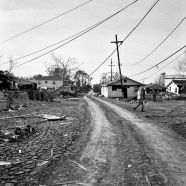





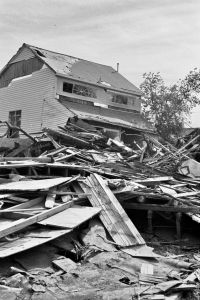
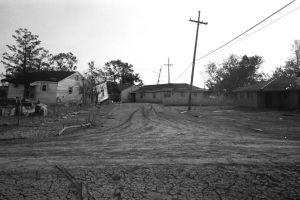
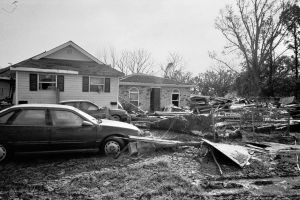
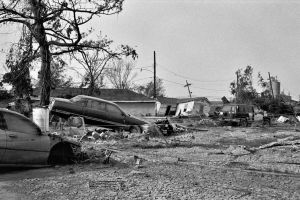
felt what it must have been like to be there, well done author!